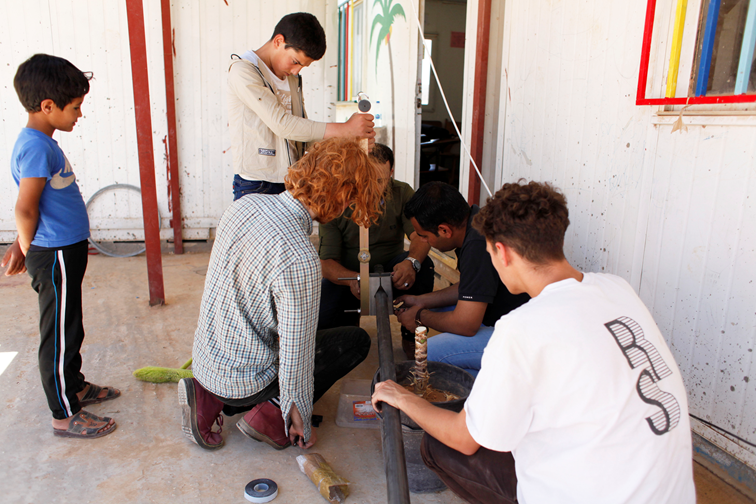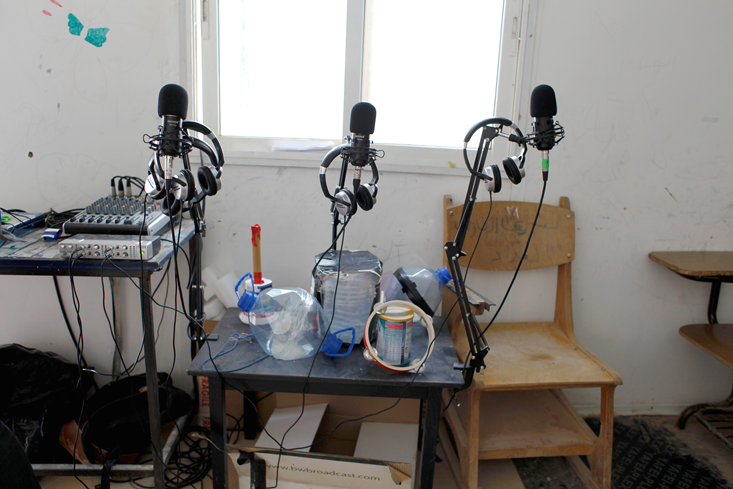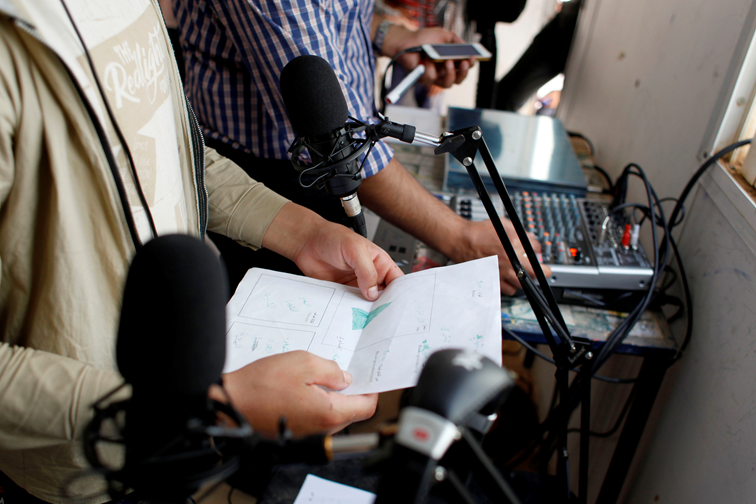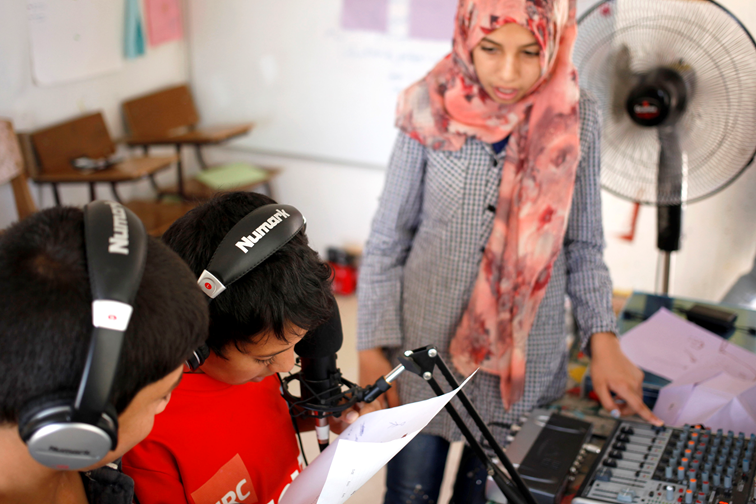The purpose of this blog series is to encourage people to begin their own grassroots humanitarian projects. By sharing my own experiences with Zaatari Radio I hope I can inspire as many other people as possible to take action and begin their own innovative projects. As the name suggests, Zaatari Radio went about establishing a refugee-run radio station in Zaatari Village, Jordan and therefore this blog will outline what was necessary to broadcast FM radio, and other ways in which your own grassroots project can embrace audio. What equipment do we need to broadcast radio? How can we get granted authorisation to broadcast radio? And what other options are available in order ‘embrace audio’? These are the questions that I’ll be answering order to get your radio mast set-up and transmitting.
But Why Audio?
Before we travelled to Jordan we administered an assessment in order to best understand the communication preferences of the war-affected population of Zaatari Village. We discovered two key findings that underpinned our key project objectives: many people enjoyed listening to the radio for entertainment and pleasure, and that previous UNHCR needs assessments had highlighted an information void that refugees were living in. So whilst radio was highlighted as a trusted channel for communication that engaged with refugee communities, it was not currently being used as a source for trusted information. Therefore in radio, we have a powerful and dependable source of information, yet a distinct lack in sources of information curated for Zaatari. In establishing Zaatari Radio, we aimed to fill this information void, broadcasting refugee-relevant information as well as offering an entertainment service for those listening to the station, as well as for those who are hosting radio programs.

Broadcasting FM Radio
Broadcasting radio can seem like a daunting task, and may put some people off. However, from an equipment point of view, the necessary components needed to broadcast radio are relatively cheap and easy to use. In fact, we were almost able to fit an entire radio station within two airport-ready luggage bags. Nonetheless, before you begin purchasing the radio equipment, you must ensure that you have the necessary authorisation to broadcast FM radio. This means contacting the relevant authority and governmental department. For our work in Zaatari, we partnered with Acting For Change International who were invaluable in the assistance they gave us in this process. By partnering with an organisation with local expertise and contacts with local municipalities, this process can be straightforward and resolved over an email or video call exchange. Importantly, the authorisation granted to broadcast radio will come with strict procedures that you must stick to. Radio can be used for as much bad as good and radio within the humanitarian field presents a unique set of necessary considerations and nuances that will ensure your broadcasts are appropriate and serve their purpose. These guidelines will usually state the agreed broadcasting radius and prevent content protruding into potentially sensitive areas.
The equipment needed to broadcast radio can be found in a variety of places, however, companies will often offer ‘complete packages.’ Nonetheless, in reality, the equipment you need will be much less (and cheaper) than this, and can be reduced to a mere seven items:
- Aerial
- Mast
- FM Transmitter
- Headphones
- Amplifier
- Mixer
- Microphone (and cables)
These pieces of equipment should be simple enough to use for any technophobe, nonetheless, a simple search engine examination will detail their use and instructions in an easy to comprehend format. We gathered most of our equipment prior to travelling to Jordan, however, in retrospect we would have liked to gather the more commonly found equipment from the country we were working in. In gathering last minute cables we met a former UNHCR Communication Officer who runs an electrical shop in downtown Amman, and purchasing the mast in Zaatari meant we kept business within the local economy.

Creating Radio Programs
We created a radio-based curriculum that not only taught refugees how to use the radio equipment, creating the future broadcasters for the station, but also offered guidance in the types of radio programs that can be broadcast based on needs assessments reports published by UNHCR and local aid agencies, as well as being within the agreed remit of local authorities. Needs reports had indicated that over 70% of primary medical visits in the Zaatari area were attributed to communicable diseases; illnesses that are spread from person to person due to poor hygiene practices. Through targeted health campaigns, Zaatari Radio broadcasts aim to change attitudes and behaviours towards hygiene within the Zaatari region, as well as share information regarding early symptoms of illness. Short scripted dramas were prepared for transmission that were aimed to investigate prevalent health issues in Zaatari as well as being entertaining. These were scripted based on ‘health briefs’ that were issued our radio workshops allowing us to examine the health issue in more detail. Zaatari Radio also aims to fill an information void by disseminating important information regarding the refugee population, including the services provided to them within Zaatari Village such as local education programs for children and adults. We also are committed to encouraging the development of artistic endeavour within Zaatari Village whilst providing an entertainment service. Broadcasts focused on live music as well as pre-recorded music from Syria and Jordan, as well as other forms of artistic expression such as poetry and singing.
These radio programs were structured to broadcast along with our project objectives, however, perhaps our best results were the radio programs that were unplanned that grew organically. We found that the presence of the microphones and headphones were enough to prompt conversation between Syrians and Jordanians. The radio soon became a contact point between refugees and their host-communities, where the hosts shared each others company that happened to also be broadcast live on air. The takeaway point here is that not only can a radio become a medium in which refugees and the local community can form relations, but also be open to new ways in which people wish to use the radio infrastructure.
Beyond Radio: Listening Groups and More
Audio in action spans beyond radio-based humanitarian responses. There are plenty of other options that are low-cost, low-fi and ones that avoid the bureaucratic necessities of being granted permissions for FM broadcasting. If your hearts are set on a radio project consider the possibilities of broadcasting via the Internet. For our next project in Angola, we are focusing on streaming live online to not only target a younger tech-savvy audience but also make listening available worldwide to support the emergence of local music in other countries. Nonetheless, other audio-based humanitarian initiatives have shown just as fruitful outcomes, namely listening groups.
Listening groups have been herald as an effective medium to address growing calls for better Accountability to Affected Populations (AAP), Communicating with Communities (CwC), and using feedback, ‘real-time monitoring’ and evaluation as a means to improve programming and outcomes of humanitarian initiatives. In listening groups, participants meet regularly over a given time to listen to audio programming and discuss issues and challenges they face as a means to review awareness and content of programmes aimed at their community. The content and direction of these meetings are designed to gain a better understanding of the evolving information needs of the community and deliver feedback on programmes in an informal setting to encourage positive change and accountability. The creation of a grassroots humanitarian project focusing on listening groups can serve to address the evolving environment of refugee status, encourage the formation of relationships and trust, and help cultivate a sense of community engagement and ownership of humanitarian programmes.
Listening groups can take place abroad in refugee communities living in countries such as Jordan, but also designed to run in your local population for refugees who have been relocated within your local community. Within listening groups, participants are encouraged to have an open conversation that is recorded, which can be used to ignite discussion within listening groups featuring different participants. Bringing relevant materials to the general topic in which you hope to discuss can start an initial discussion amongst groups. For example, leaflets circulating refugee camps that provide information on breastfeeding can be brought in at the start of group, followed by simple questions to ignite discussion: Is the information provided on the leaflet relevant to you? Did you learn anything to change how you approach this issue? What other issues affecting your community are not being addressed? Similarly, discussions could begin with questions focusing on services available within the UK to refugees and how they have been received amongst the group. This feedback could be shared with the relevant services to provide real-time feedback in order to promote positive change and better integration within UK society.

Feedback
These, however, are just suggestions based upon my own experience of audio-based humanitarian work, and I suggest researching other successful stories of ways in which people have embraced audio! Find out more about UNHCR work with ‘Les Informateurs’ in Angola and ‘Boda Boda Talk’ in Uganda, as well as our experiences broadcasting radio in Jordan.
I hope I have inspired you to take the plunge into an audio-based humanitarian project, and made this step a little easier! We would love to hear about your experiences in embracing audio, or if you have any questions please do not hesitate to get in contact with Zaatari Radio.
If you want to follow our journey at Zaatari Radio – stay tuned and discover more here:
- Website: https://www.radiozaatari.com/
- Instagram: https://www.instagram.com/radiozaatari/
- Twitter: https://twitter.com/radiozaatari
- Soundcloud: https://soundcloud.com/radiozaatari
We’re always looking for great stories, ideas, and opinions on innovations that are led by or create impact for refugees. If you have one to share with us send us an email at [email protected]
If you’d like to repost this article on your website, please see our reposting policy.

